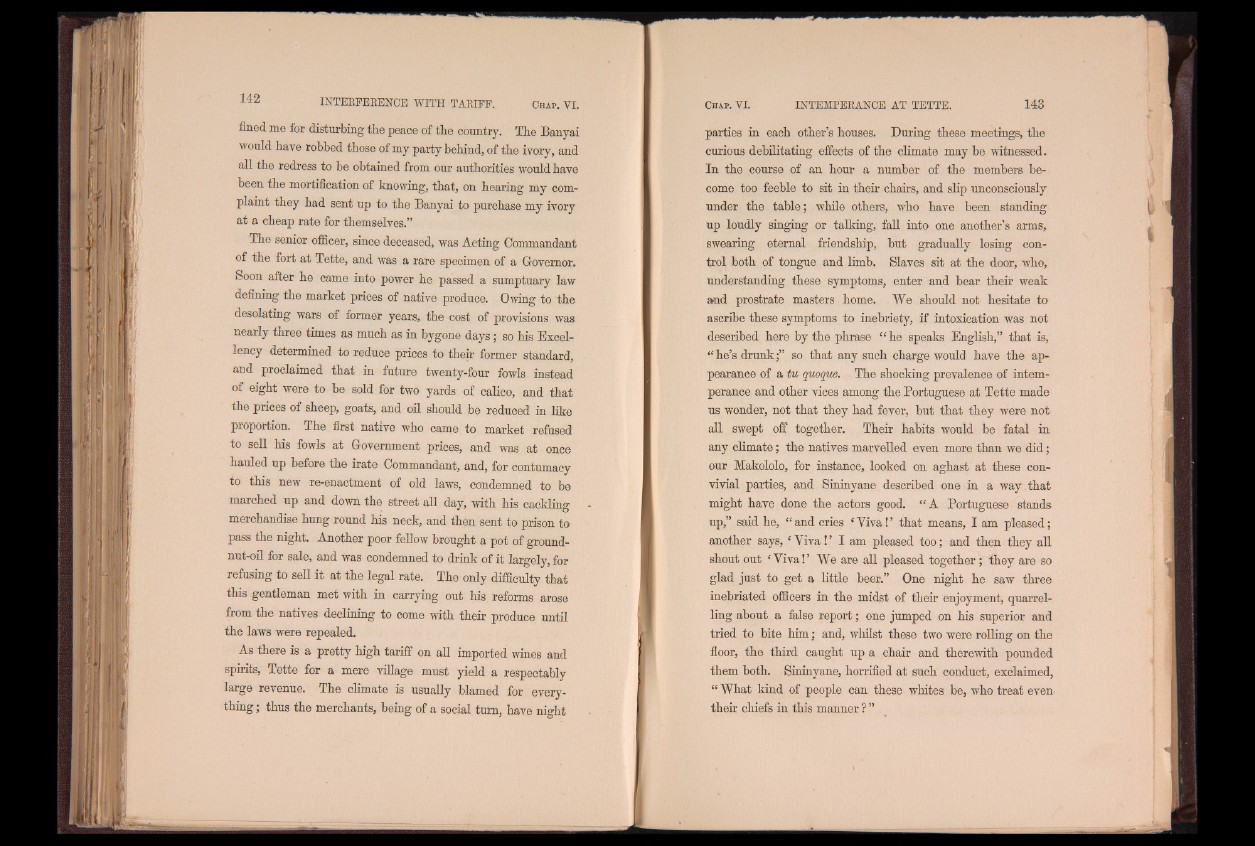
fined me for disturbing the peace of the country. The Banyai
would have robbed those of my party behind, of the ivory, and
all the redress to be obtained from our authorities would have
been the mortification of knowing, that, on hearing my complaint
they had sent up to the Banyai to purchase my ivory
at a cheap rate for themselves.”
The senior officer, since deceased, was Acting Commandant
of the fort at Tette, and was a rare specimen of a Governor.
Soon after he came into power he passed a sumptuary law
defining the market prices of native produce. Owing to the
desolating wars of former years, the cost of provisions was
nearly three times as much as in bygone days; so his Excellency
determined to reduce prices to their former standard,
and proclaimed that in future twenty-four fowls instead
of eight were to be sold for two yards of calico, and that
the prices of sheep, goats, and oil should be reduced in like
proportion. The first native who came to market refused
to sell his fowls at Government prices, and was at once
hauled up before the irate Commandant, and, for contumacy
to this new re-enactment of old laws, condemned to be
marched up and down the street all day, with his cackling
merchandise hung round his neck, and then sent to prison to
pass the night. Another poor fellow brought a pot of ground-
nut-oil for sale, and was condemned to drink of it largely, for
refusing to sell it at the legal rate. The only difficulty that
this gentleman met with in carrying out his reforms arose
from the natives declining to come with their produce until
the laws were repealed.
As there is a pretty high tariff on all imported wines and
spirits, Tette for a mere village must yield a respectably
large revenue. The climate is usually blamed for everything
; thus the merchants, being of a social turn, have night
parties in each other’s houses. During these meetings, the
curious debilitating effects of the climate may be witnessed.
In the course of an hour a number of the members become
too feeble to sit in their chairs, and slip unconsciously
under the table; while others, who have been standing
up loudly singing or talking, fall into one another’s arms,
swearing eternal friendship, but gradually losing control
both of tongue and limb. Slaves sit at the door, who,
understanding these symptoms, enter and bear their weak
and prostrate masters home. We should not hesitate to
ascribe these symptoms to inebriety, if intoxication was not
described here by the phrase “ he speaks English,” that is,
“ he’s drunk;” so that any such charge would have the appearance
of a tu quoque. The shocking prevalence of intemperance
and other vices among the Portuguese at Tette made
us wonder, not that they had fever, but that they were not
all swept off together. Their habits would be fatal in
any climate; the natives marvelled even more than we did;
our Makololo, for instance, looked on aghast at these convivial
parties, and Sininyane described one in a way that
might have done the actors good. “ A Portuguese stands
up,” said he, “ and cries ‘Viva!’ that means, I am pleased;
another says, ‘Viva!’ I am pleased too; and then they all
shout out ‘Viva!’ We are all pleased together ; they are so
glad just to get a little beer.” One night he saw three
inebriated officers in the midst of their enjoyment, quarrelling
about a false report; one jumped on his superior and
tried to bite him; and, whilst these two were rolling on the
floor, the third caught up a chair and therewith pounded
them both. Sininyane, horrified at such conduct, exclaimed,
“ What kind of people can these whites be, who treat even,
their chiefs in this manner ? ”